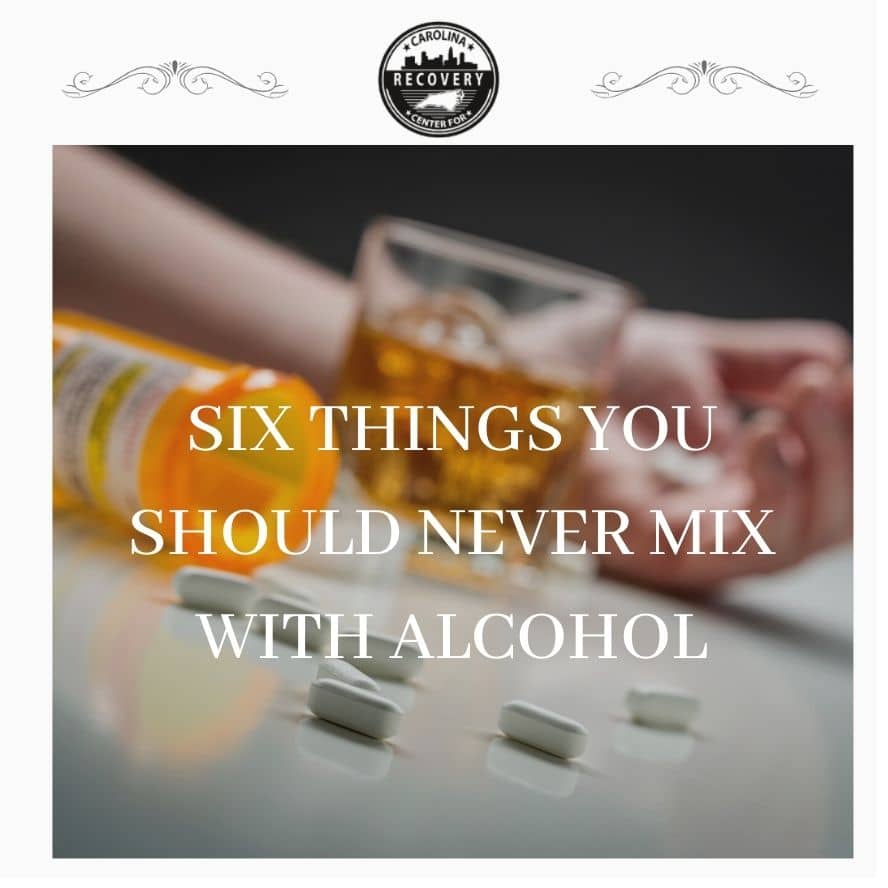6 Things You Should Never Mix With Alcohol

Medically Verified: 2/1/24
Medical Reviewer
Chief Editor

All of the information on this page has been reviewed and verified by a certified addiction professional.
Alcohol is a regular feature in American culture. Many of the social gatherings we attend include–or revolve around–enjoying alcoholic beverages. Happy hours, summer BBQs, happy hours, and other celebrations usually involve drinking with friends.
While drinking in moderation can be part of a healthy lifestyle, some people develop problematic drinking or alcohol addiction. So, how much alcohol is considered safe?
The CDC defines moderate drinking as having one alcoholic drink per day for women and two a day for men.[1] Regularly drinking more than this can increase your risk of complications, such as liver disease, damage to your heart and brain, and certain cancers. Heavy drinking, including binge drinking, can increase the likelihood of being involved in an accident or getting hurt because you are intoxicated. People who often drink more than is recommended engage in illegal or dangerous behavior at higher rates than people who do not.
Mixing drugs with alcohol raises the risk of severe medical problems, including immediate and life-threatening side effects in some cases. Knowing many common things never to mix with alcohol can help you avoid serious harm to your health and safety.
Things to Never Mix With Alcohol: Common OTC Medications
Many people think that if you can buy a medication from a drug store, it must be safe. However, mixing alcohol with other drugs, including over-the-counter ones you consider safe, is a bad idea. Two of the most common medications you take without much thought can cause some severe harm to your health.
1. OTC pain relievers
You shouldn’t mix common pain relievers like Tylenol (acetaminophen) and Ibuprofen with alcohol. Doing so can lead to nausea, ulcers, and stomach pain or bleeding. Mixing alcohol with other drugs like Tylenol and Ibuprofen can also damage your liver. These effects usually develop after a long period of mixing alcohol and OTC pain relievers.[2]
2. NyQuil and other cough syrups
If you mix NyQuil with alcohol, you can suffer serious–sometimes life-threatening–effects. The active ingredients in NyQuil and other cough syrups can interact with the alcohol to dangerously depress your respiratory system. This can lead to slow or shallow breathing.[3]
Remember that mixing alcohol with other drugs is not a good idea, even if the medications seem harmless.
What Not to Mix With Alcohol: Common Prescription Medications
Imagine that you receive a prescription from your doctor and see that it has a warning about mixing the medication with alcohol. Just how seriously should you take that warning?
You should take it very seriously. Some antidepressants, antibiotics, prescription painkillers, and other medications can have dangerous results if taken with alcohol.
3. Antibiotics
Some antibiotics, including the commonly prescribed Zithromax and Metronidazole, can have nasty side effects. Nausea, elevated heart rate, and liver damage are some of the potential risks of mixing antibiotics and alcohol.[3]
4. Antidepressants
Antidepressants top the list of things never to mix with alcohol. Alcohol can interact with antidepressants and cause your depression to worsen. It can also dangerously raise your blood pressure and cause drowsiness that puts you at risk of accidents and injuries.[3]
5. Gabapentin
Mixing gabapentin and alcohol sometimes leads to serious side effects. Gabapentin is generally used to treat seizures. When mixed with alcohol, it can lead to a range of uncomfortable or dangerous symptoms, including:
- Confusion
- Dizziness
- Anxiety
- Fatigue
- Headaches
- Nausea
- Slow breathing
Respiratory system depression that occurs when you mix gabapentin and alcohol can be life-threatening. Avoid mixing alcohol with other drugs and take all medications as prescribed.
6. Benzodiazepines
Benzodiazepines like Xanax (alprazolam), Valium (diazepam), and Klonopin (clonazpam) are used to treat anxiety and panic disorders, but they can be addictive if abused. When benzodiazepine drugs are mixed with alcohol, their effects become enhanced and the risk for respiratory depression and benzo overdose increases.[4]
What Should I Do if I’m Mixing Alcohol With Other Drugs?
First, you must follow your doctor’s advice about mixing alcohol with other drugs. Many drugs have dangerous, sometimes life-threatening side effects if they are combined with other substances, including alcohol. Tell your doctor if you drink alcohol regularly and ask if you need to stop drinking when taking any medication, including over-the-counter drugs.
If you feel unable to stop drinking when you want to, you may live with alcohol addiction. Addiction is a serious and complex condition, and many people require addiction treatment to overcome it.
Addiction treatment is available in many different settings and levels of care. These include outpatient programs, residential and inpatient options, and partial hospitalization treatment programs.
If you are experiencing symptoms of addiction, speak with a medical professional or addiction specialist who can recommend the correct type of treatment program to help you work through it.
Learn More About Substance Abuse Treatment at the Carolina Center for Recovery
If you or someone you love are living with alcohol addiction or another type of substance abuse, reach out to the caring specialists at the Carolina Center for Recovery for information about our treatment programs.
We offer a range of treatment options in a safe, supportive environment. You do not need to live with addiction. Reach out today to learn how to start treatment.
References:

